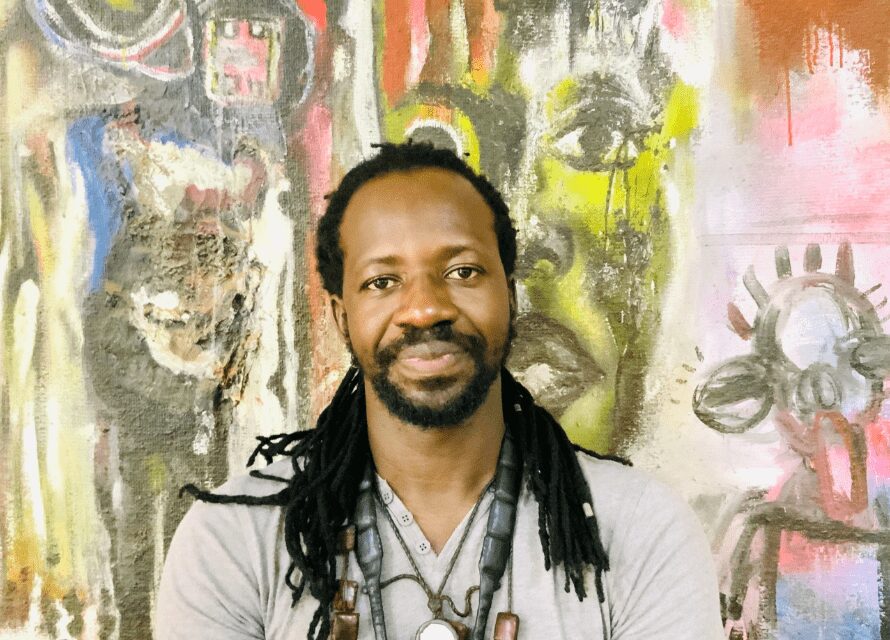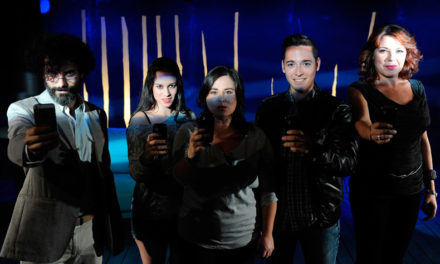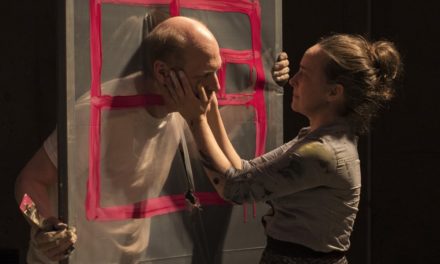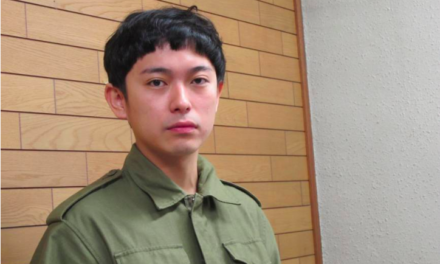Aguibou Bougobali Sanou (known as Bougobali) is a choreographer, performer, and director of the In-Out Festival in Burkina Faso. A recipient of many awards and grants including a Fulbright fellowship, he received another fellowship from NYU -The Center for Ballet and The Arts (NYU-CBA) in 2020, and hopefully should come to the States this year. He also recently created a dance program for young inmates (City of Bobo Dioulasso, BK) to help them to re-integrate their communities.
French Cultural Services: In February of 2021, the In-Out festival took place in Burkina Faso. Can you tell us about the creation of this festival, of which this was the 8th edition?
Bougobali: Yes. This year we had the 8th edition of the In-Out Dance Festival with the theme “Reinvent.” The international dance meetings that take place in the public space of Bobo-Dioulasso are part of an international and professional dance festival created in 2014. The festival aims to democratize dance and make it accessible for all by opening up space for a true cultural industry that participates actively in the economy and in the empowerment of the local population.
– Where does it take place?
In-Out Dance Festival is based in Bobo-Dioulasso, the second largest city, breeding ground and cultural hub in Burkina Faso. The festival is spread across five different cities in Burkina Faso (Bama, Houndé, Orodara, Banfora and Bobo-Dioulasso). The shows take place in theatres (Institut Français of Bobo-Dioulasso) as well as in family homes, civil prisons, military camps, in front of the great Dioulassoba mosque, in the streets, and at the Bobo-Dioulasso market.
– How has it evolved and what does it look like?
Each edition of the festival addresses a new theme that is debated in round tables, conferences and workshops. Professional artists from around the world and amateurs who are passionate about culture join together in Bobo-Dioulasso to discuss, share and ask questions for two weeks in the context of the In-Out Festival.
– How are you supported for this initiative?
Today, the festival is strongly supported by the mayor of Bobo-Dioulasso, the US Embassy in Burkina Faso, the Institut Français of Paris and of Bobo-Dioulasso and multiple patrons like Wend-Konta, the Sobucop, and Prime Oil who support the mission of the festival. All this is possible because the local population, the women, the neighborhood grandmothers and the chiefdom have claimed ownership of the festival. It’s an event of the Accart-Ville neighborhood, of the city of Bobo-Dioulasso, thought up and founded by Aguibou Bougobalai SANOU and organized mainly by the Tamadia Company Association (*). It’s an event for and by the local, national and international community.
(*) Tamadia Company: Bougobali’s own company
French Cultural Services: As a resident at NYU-CBA, you hope to soon come to New York. What will be the subject of your research?
Bougobali: Yes, I am very honored by this award. My NYC-CBA residency project is a homage to my late mother, Watte Dembelé. The piece is called “Talking to my Mum or at Watta Dembelé’s place.” Our mother used to tell us that there is no such thing as work reserved only for men, nor work reserved only for women. Women and men can and must do the same work. This project will be a mix of dance, live music, live cuisine and visual arts.
French Cultural Services: Has the COVID crisis changed your expectations for the future?
Bougobali: The COVID crisis has changed the world for good. The world is a perpetual cycle. We are at the end of one cycle and therefore at the beginning of another. We have to unite with technology when necessary, but we must more importantly make sure that technology does not erase the humanity at the heart of the human. The role of artists is to constantly remind people of this, through our works and our events.
French Cultural Services: This is not the first time that you’ve come to the US; you were the recipient of a Fulbright grant from the US State Department in 2018, and you taught at Naugatuck Valley Community College and other universities and colleges like Bennington College. What did you teach your students?
Bougobali: Fulbright was a very rich and beautiful experience for me. A time of teaching and learning. I taught the history and analysis of dance in the world (DAN101), I developed and put in place an African dance curriculum, and I taught a 45-minute repertory from the Tamadia Company (Rebours) to students at Naugatuck Valley Community College. I gave conferences in multiple U.S. states to promote Burkina Faso through the National Week of Culture, the Fespaco (Panafrican film festival in Ouagadougou), the In-Out Dance Festival (dance), the Faso Danfani (renowned hand woven cotton clothes from Burkina Faso), the Festima (International festival of masks and arts in Dédougou).
-What stood out to you during your American experience?
Bougobali: The patriotism of the American people, the respect for the professor, the valuing of the artist, the hunger for knowledge. The American people are a hardworking and happy people. The American people give you the chance to do your research without too many procedural constraints.
French Cultural Services: And to conclude, we return to your beginnings. What lead you to dance?
Bougobali: Since I was little, my mother, Watta Dembelé, who was a housewife, danced and sang for us. She told us stories, and every story had its own dance. Later on, while I was studying, my litter sister (Aminata SANOU – now a Nelson Mandela UNESCO prize winner) and I did dance competitions, competitions between districts in traditional and or modern dance. But it wasn’t until 2005 that I had my first experience in contemporary dance with the choreographer Salia SANOU. Today, I dance to calm souls, to interrogate, and to participate in the construction of the human.
MERCI, Bougobali. See you very soon in the States
This interview was conducted in March, in French, with Nicole Birmann Bloom, Program Officer, Performing Arts; Translation into English by Lucy Rice.
This article was originally posted in French Culture and has been reposted with permission. To read the original article, click here.
This post was written by the author in their personal capacity.The opinions expressed in this article are the author’s own and do not reflect the view of The Theatre Times, their staff or collaborators.
This post was written by Nicole Birmann Bloom.
The views expressed here belong to the author and do not necessarily reflect our views and opinions.


















